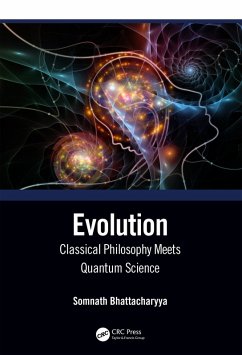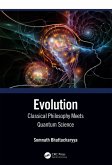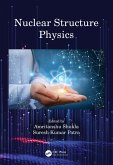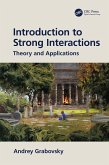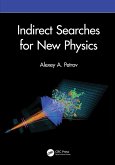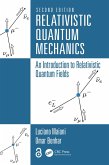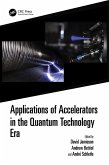52,95 €
52,95 €
inkl. MwSt.
Sofort per Download lieferbar

26 °P sammeln
52,95 €
Als Download kaufen

52,95 €
inkl. MwSt.
Sofort per Download lieferbar

26 °P sammeln
Jetzt verschenken
Alle Infos zum eBook verschenken
52,95 €
inkl. MwSt.
Sofort per Download lieferbar
Alle Infos zum eBook verschenken

26 °P sammeln
- Format: ePub
- Merkliste
- Auf die Merkliste
- Bewerten Bewerten
- Teilen
- Produkt teilen
- Produkterinnerung
- Produkterinnerung

Bitte loggen Sie sich zunächst in Ihr Kundenkonto ein oder registrieren Sie sich bei
bücher.de, um das eBook-Abo tolino select nutzen zu können.
Hier können Sie sich einloggen
Hier können Sie sich einloggen
Sie sind bereits eingeloggt. Klicken Sie auf 2. tolino select Abo, um fortzufahren.

Bitte loggen Sie sich zunächst in Ihr Kundenkonto ein oder registrieren Sie sich bei bücher.de, um das eBook-Abo tolino select nutzen zu können.
This book reconceptualizes the ancient philosophy of "dualism" and a "trinity" applied to classical and quantum nonequilibrium phenomena. It contains in-depth research (over 10 years) on the ancient eastern (Indian) philosophy and the latest scientific research in condensed matter and quantum technology by the author.
- Geräte: eReader
- mit Kopierschutz
- eBook Hilfe
Andere Kunden interessierten sich auch für
![Evolution (eBook, PDF) Evolution (eBook, PDF)]() Somnath BhattacharyyaEvolution (eBook, PDF)52,95 €
Somnath BhattacharyyaEvolution (eBook, PDF)52,95 €![Nuclear Structure Physics (eBook, ePUB) Nuclear Structure Physics (eBook, ePUB)]() Nuclear Structure Physics (eBook, ePUB)62,95 €
Nuclear Structure Physics (eBook, ePUB)62,95 €![Introduction to Strong Interactions (eBook, ePUB) Introduction to Strong Interactions (eBook, ePUB)]() Andrey GrabovskyIntroduction to Strong Interactions (eBook, ePUB)46,95 €
Andrey GrabovskyIntroduction to Strong Interactions (eBook, ePUB)46,95 €![Indirect Searches for New Physics (eBook, ePUB) Indirect Searches for New Physics (eBook, ePUB)]() Alexey A. PetrovIndirect Searches for New Physics (eBook, ePUB)48,95 €
Alexey A. PetrovIndirect Searches for New Physics (eBook, ePUB)48,95 €![Relativistic Quantum Mechanics (eBook, ePUB) Relativistic Quantum Mechanics (eBook, ePUB)]() Luciano MaianiRelativistic Quantum Mechanics (eBook, ePUB)79,95 €
Luciano MaianiRelativistic Quantum Mechanics (eBook, ePUB)79,95 €![Gauge Theories in Particle Physics, 40th Anniversary Edition: A Practical Introduction, Volume 2 (eBook, ePUB) Gauge Theories in Particle Physics, 40th Anniversary Edition: A Practical Introduction, Volume 2 (eBook, ePUB)]() Ian J R AitchisonGauge Theories in Particle Physics, 40th Anniversary Edition: A Practical Introduction, Volume 2 (eBook, ePUB)58,95 €
Ian J R AitchisonGauge Theories in Particle Physics, 40th Anniversary Edition: A Practical Introduction, Volume 2 (eBook, ePUB)58,95 €![Applications of Accelerators in the Quantum Technology Era (eBook, ePUB) Applications of Accelerators in the Quantum Technology Era (eBook, ePUB)]() Applications of Accelerators in the Quantum Technology Era (eBook, ePUB)54,95 €
Applications of Accelerators in the Quantum Technology Era (eBook, ePUB)54,95 €-
-
-
This book reconceptualizes the ancient philosophy of "dualism" and a "trinity" applied to classical and quantum nonequilibrium phenomena. It contains in-depth research (over 10 years) on the ancient eastern (Indian) philosophy and the latest scientific research in condensed matter and quantum technology by the author.
Dieser Download kann aus rechtlichen Gründen nur mit Rechnungsadresse in A, B, BG, CY, CZ, D, DK, EW, E, FIN, F, GR, HR, H, IRL, I, LT, L, LR, M, NL, PL, P, R, S, SLO, SK ausgeliefert werden.
Produktdetails
- Produktdetails
- Verlag: Taylor & Francis eBooks
- Seitenzahl: 204
- Erscheinungstermin: 29. September 2023
- Englisch
- ISBN-13: 9781000923827
- Artikelnr.: 68780040
- Verlag: Taylor & Francis eBooks
- Seitenzahl: 204
- Erscheinungstermin: 29. September 2023
- Englisch
- ISBN-13: 9781000923827
- Artikelnr.: 68780040
- Herstellerkennzeichnung Die Herstellerinformationen sind derzeit nicht verfügbar.
Somnath Bhattacharyya is currently a professor of physics specializing in quantum mechanics, quantum computing, and nanotechnology. Through his research activities, he has been privileged to have spent much of his life abroad, outside of his native country India. Thanks to his diverse background and extensive traveling, Somnath has been able to develop several fundamental ideas linking contemporary physics to eastern philosophy. This includes reinterpretations of topics such as Schrodinger's cat paradox, light-matter interaction, and other foundational phenomena that have perplexed scientists for decades. Through his research, Somnath has constructed models linking such scientific theories with ancient concepts whose origins reach back to many centuries ago. Somnath's studies however are not limited to just science; he has spent much time investigating one of the most abstract and elusive and yet fundamental subjects, the concept of god; as well as answering some of the most paramount, yet enduring questions about reality. Through examining a variety of artifacts displayed at various locations around the world, and numerous different religious and philosophical texts, in addition to several works dealing with metaphysics and mysticism; Somnath is uncovering invaluable information connecting and explaining some of the world's most influential religions, philosophies, and ideas in very profound ways. His main interest lies in the understanding of 'creation'. Somnath is the co-founder of the Society for Agni Vigyan Advancement (https://www.agnivigyan.com/) where he bridging the gap between science and philosophy. Through the display of his photos, he tries to simplify some of the complicated concepts of philosophy and science.
Preamble: Philosophy through careful observation and self-realization-the birth of cycles. 1. Creation? A cosmic model: Birth of Matter and Mind: Two Cycles 2. Background/history-Understanding creation: Gods and Goddesses. 3. Life Begins on Earth-Creation of the Devices, Deities, and the Concept of God: Creation of Cycles 4. Theory of evolution-(Sankhya) Philosophy of dualism: Creation of a Cycle 5. Interactions at the Macroscale-Classical mechanics-Equilibrium and Rotation: One Cycle 6. Energy/Light and Space (Matter) Application in Condensed Matter Physics: Two Cycles 7. Condensed matter physics-Creation of particles-Bosonic vs. fermionic: One and a half cycle 8: Creation through interactions at the microscale-Quantum mechanics 9. Space-Time Distortion: Black holes, Condensates, and quantum devices 10. Quantum Simulation, Artificial Intelligence, and Vision . Conclusion References.
Preamble: Philosophy through careful observation and self-realization-the
birth of cycles. 1. Creation? A cosmic model: Birth of Matter and Mind: Two
Cycles 2. Background/history-Understanding creation: Gods and Goddesses. 3.
Life Begins on Earth-Creation of the Devices, Deities, and the Concept of
God: Creation of Cycles 4. Theory of evolution-(Sankhya) Philosophy of
dualism: Creation of a Cycle 5. Interactions at the Macroscale-Classical
mechanics-Equilibrium and Rotation: One Cycle 6. Energy/Light and Space
(Matter) Application in Condensed Matter Physics: Two Cycles 7. Condensed
matter physics-Creation of particles-Bosonic vs. fermionic: One and a half
cycle 8: Creation through interactions at the microscale-Quantum mechanics
9. Space-Time Distortion: Black holes, Condensates, and quantum devices 10.
Quantum Simulation, Artificial Intelligence, and Vision . Conclusion
References.
birth of cycles. 1. Creation? A cosmic model: Birth of Matter and Mind: Two
Cycles 2. Background/history-Understanding creation: Gods and Goddesses. 3.
Life Begins on Earth-Creation of the Devices, Deities, and the Concept of
God: Creation of Cycles 4. Theory of evolution-(Sankhya) Philosophy of
dualism: Creation of a Cycle 5. Interactions at the Macroscale-Classical
mechanics-Equilibrium and Rotation: One Cycle 6. Energy/Light and Space
(Matter) Application in Condensed Matter Physics: Two Cycles 7. Condensed
matter physics-Creation of particles-Bosonic vs. fermionic: One and a half
cycle 8: Creation through interactions at the microscale-Quantum mechanics
9. Space-Time Distortion: Black holes, Condensates, and quantum devices 10.
Quantum Simulation, Artificial Intelligence, and Vision . Conclusion
References.
Preamble: Philosophy through careful observation and self-realization-the birth of cycles. 1. Creation? A cosmic model: Birth of Matter and Mind: Two Cycles 2. Background/history-Understanding creation: Gods and Goddesses. 3. Life Begins on Earth-Creation of the Devices, Deities, and the Concept of God: Creation of Cycles 4. Theory of evolution-(Sankhya) Philosophy of dualism: Creation of a Cycle 5. Interactions at the Macroscale-Classical mechanics-Equilibrium and Rotation: One Cycle 6. Energy/Light and Space (Matter) Application in Condensed Matter Physics: Two Cycles 7. Condensed matter physics-Creation of particles-Bosonic vs. fermionic: One and a half cycle 8: Creation through interactions at the microscale-Quantum mechanics 9. Space-Time Distortion: Black holes, Condensates, and quantum devices 10. Quantum Simulation, Artificial Intelligence, and Vision . Conclusion References.
Preamble: Philosophy through careful observation and self-realization-the
birth of cycles. 1. Creation? A cosmic model: Birth of Matter and Mind: Two
Cycles 2. Background/history-Understanding creation: Gods and Goddesses. 3.
Life Begins on Earth-Creation of the Devices, Deities, and the Concept of
God: Creation of Cycles 4. Theory of evolution-(Sankhya) Philosophy of
dualism: Creation of a Cycle 5. Interactions at the Macroscale-Classical
mechanics-Equilibrium and Rotation: One Cycle 6. Energy/Light and Space
(Matter) Application in Condensed Matter Physics: Two Cycles 7. Condensed
matter physics-Creation of particles-Bosonic vs. fermionic: One and a half
cycle 8: Creation through interactions at the microscale-Quantum mechanics
9. Space-Time Distortion: Black holes, Condensates, and quantum devices 10.
Quantum Simulation, Artificial Intelligence, and Vision . Conclusion
References.
birth of cycles. 1. Creation? A cosmic model: Birth of Matter and Mind: Two
Cycles 2. Background/history-Understanding creation: Gods and Goddesses. 3.
Life Begins on Earth-Creation of the Devices, Deities, and the Concept of
God: Creation of Cycles 4. Theory of evolution-(Sankhya) Philosophy of
dualism: Creation of a Cycle 5. Interactions at the Macroscale-Classical
mechanics-Equilibrium and Rotation: One Cycle 6. Energy/Light and Space
(Matter) Application in Condensed Matter Physics: Two Cycles 7. Condensed
matter physics-Creation of particles-Bosonic vs. fermionic: One and a half
cycle 8: Creation through interactions at the microscale-Quantum mechanics
9. Space-Time Distortion: Black holes, Condensates, and quantum devices 10.
Quantum Simulation, Artificial Intelligence, and Vision . Conclusion
References.
